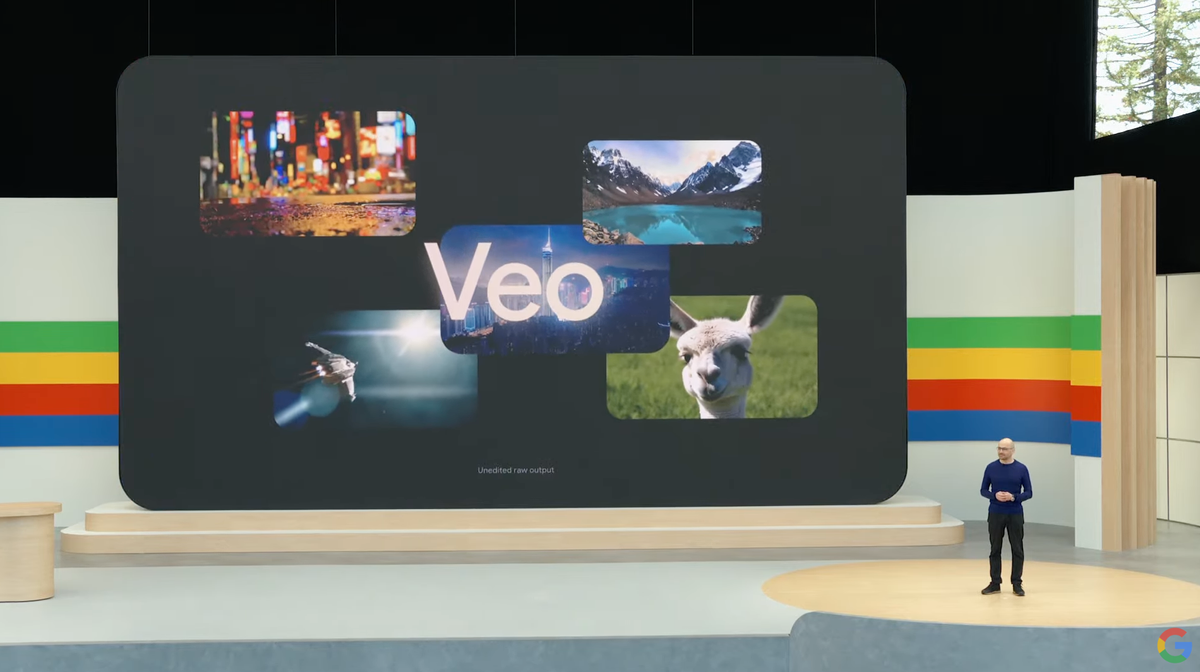### Google Introduces Veo: A Cutting-Edge Video-Generation AI Tool at Google I/O Event
Google has recently announced the launch of its newest video-generation AI tool, Veo, during the Google I/O live event. Veo stands out for its enhanced consistency, quality, and output resolution, setting a new standard in the realm of AI-generated video content. This tool joins the ranks of existing AI video content generators like Synthesia, Colossyan, and Lumiere, but promises a more sophisticated video-generation experience.
To demonstrate the capabilities of Veo, Google collaborated with a team of software engineers and film creatives, including the multi-talented Donald Glover, to produce a short film. Although the film was not shown at the I/O event, Google has assured that it will be released soon, stirring anticipation among fans of Glover and AI technology alike.
Veo is praised for its speed and flexibility in understanding prompts, whether they are in text, image, or video format. It pays close attention to cinematic details such as style, camera positioning, timing, and lighting, enabling it to render objects and their interactions with the environment more accurately and consistently. Google DeepMind CEO Demis Hassabis showcased Veo’s capabilities with a clip of a car speeding through a dystopian cyberpunk city, highlighting the tool’s potential in enhancing the creative process for filmmakers.
The introduction of Veo is part of Google’s ongoing efforts to innovate in the field of generative AI, offering new tools and possibilities for content creators. Veo will soon be available for beta testing through Google Labs’ new experimental tool, VideoFX, promising to revolutionize the way video content is generated and utilized in the creative industry.
Google recently announced the introduction of its new video-generation AI tool, Veo, during the Google I/O live event. Veo is touted for its enhanced consistency, quality, and output resolution, setting a new standard in the realm of AI-generated video content. This technology joins the ranks of existing tools like Synthesia, Colossyan, and Lumiere, which have capitalized on the burgeoning interest in generative AI. However, Veo distinguishes itself by promising a superior video-generation experience.
To demonstrate the capabilities of Veo, Google collaborated with a team of software engineers and film professionals, including the multi-talented Donald Glover, known for his work in “Community” and “Atlanta,” to produce a short film. Although the film was not showcased at the I/O event, Google has indicated that it will be released in the near future. This collaboration has sparked interest, especially among those who appreciate Glover’s creative output and are simultaneously intrigued and cautious about the role of generative AI in the arts.
Donald Glover has praised Veo for its speed and its ability to serve as a creative tool that enhances the ability to experiment and iterate quickly. Veo’s advanced prompt understanding, which can interpret text, images, or video inputs, allows for detailed customization of cinematic style, camera angles, timing, and lighting, ensuring accurate and consistent rendering of scenes and objects within their environments. This was exemplified in a demonstration by Demis Hassabis, CEO of Google DeepMind, featuring a clip of a car speeding through a dystopian cyberpunk city.
Veo’s potential extends beyond content creation to applications in storyboarding and editing, offering filmmakers a tool to visualize and plan their work on a much faster timescale. This could significantly streamline the filmmaking process, making it more efficient and allowing for greater creative exploration.
Google plans to make Veo available as part of an experimental tool called VideoFX, which will soon be open for beta testing in Google Labs. This development represents a significant step forward in the integration of AI in creative processes, promising to unlock new possibilities for filmmakers and content creators.

